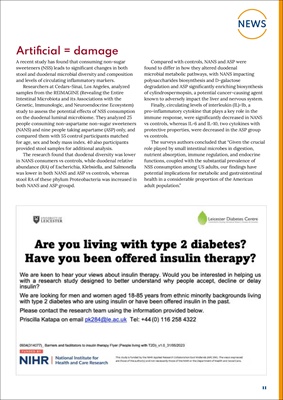
11
NEWS
Artificial = damage
A recent study has found that consuming non-sugar
sweeteners (NSS) leads to significant changes in both
stool and duodenal microbial diversity and composition
and levels of circulating inflammatory markers.
Researchers at Cedars-Sinai, Los Angeles, analyzed
samples from the REIMAGINE (Revealing the Entire
Intestinal Microbiota and its Associations with the
Genetic, Immunologic, and Neuroendocrine Ecosystem)
study to assess the potential effects of NSS consumption
on the duodenal luminal microbiome. They analyzed 25
people consuming non-aspartame non-sugar sweeteners
(NANS) and nine people taking aspartame (ASP) only, and
compared them with 55 control participants matched
for age, sex and body mass index. 40 also participants
provided stool samples for additional analysis.
The research found that duodenal diversity was lower
in NANS consumers vs controls, while duodenal relative
abundance (RA) of Escherichia, Klebsiella, and Salmonella
was lower in both NANS and ASP vs controls, whereas
stool RA of these phylum Proteobacteria was increased in
both NANS and ASP groupd.
Compared with controls, NANS and ASP were
found to differ in how they altered duodenal
microbial metabolic pathways, with NANS impacting
polysaccharides biosynthesis and D-galactose
degradation and ASP significantly enriching biosynthesis
of cylindrospermopsin, a potential cancer-causing agent
known to adversely impact the liver and nervous system.
Finally, circulating levels of interleukin (IL)-1b, a
pro-inflammatory cytokine that plays a key role in the
immune response, were significantly decreased in NANS
vs controls, whereas IL-6 and IL-10, two cytokines with
protective properties, were decreased in the ASP group
vs controls.
The surveys authors concluded that "Given the crucial
role played by small intestinal microbes in digestion,
nutrient absorption, immune regulation, and endocrine
functions, coupled with the substantial prevalence of
NSS consumption among US adults, our findings have
potential implications for metabolic and gastrointestinal
health in a considerable proportion of the American
adult population."